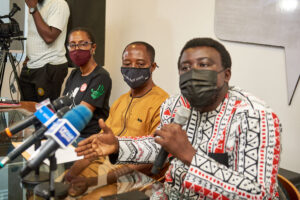
Lagos, Thursday, September 16, 2021: Leading civil society organisations in Nigeria have converged in a media briefing held on Monday, September 13th, to bemoan the ongoing Twitter Ban by the Federal Government of Nigeria since June 4th, 2021, and its lingering consequences.
The conference, which was held to mark 100 days since the ban, took a critical look at the origin of the ban, the blatant disregard for rule-of-law by the federal government and the ban’s dire consequences to the economy and the citizenry of Nigeria.
Speaking at the session, Executive Director of Enough Is Enough (EiE) Nigeria, Yemi Adamolekun described the ban as a disservice to the government, who, in a bid to stifle its citizens, had also destroyed the positive impact of agencies like the Nigeria Centre for Disease Control (NCDC) which—up until the ban—provided COVID-19 updates and kept citizens aware and conscious of the pandemic.
She said: “We have issues like unemployment, a pandemic, insecurity, poverty, and absence of a sense of belonging, the government neglected their concerns and moved to ban Twitter.
“If the government of Nigeria wanted to ban Twitter, they could have done it legally, but there is no document, either a legal document or court order backing their action. This is a gross violation of human rights, and we must hold the government accountable.
“Twitter has shown its ability to help mobilise younger Nigerians and give them a voice. And as we go on to the 2023 general election and as long as the federal government chooses not to deal with the fundamental issues that Nigerians have. And as long as there’s a place that Nigerians can exercise their voice — Twitter, radio, Facebook, Instagram — they will find a way to express themselves.”
Yemi also stated that the action of the Federal Government “is just laziness and shows they are not ready to solve the problems on the table”.
Also present at the press briefing was Executive Director of Paradigm Initiative (PIN), Gbenga Sesan who confirmed that the ban had impacted revenue projections of many businesses.
He disclosed that according to NetBlocks, “Nigeria has lost about $250,000 every hour since the Twitter ban, a figure arrived at using the Brookings Institution method.”
He added that though the government claimed the social media platform was being used by warmongers to destabilise the country, the ban was more about the ego of the President and the lies of the Minister of Information and Culture, Lai Mohammed who could not comprehend the boldness and wit with which young Nigerians demanded accountability from their leaders on the platform.
Sesan noted that the present administration, having failed in doing its job of arresting criminals and terrorists who use social media, decided to stifle the entire population and make Nigerians suffer for its failings.
Giving an insight into some of the activities carried out by CSOs since the ban, Director of Programmes, Media Rights Agenda (MRA), Ayode Longe, stated that as soon as the Twitter ban came into effect, civil groups jointly condemned the action, and called on the federal government to withdraw the order.
Longe stated that the Socio-Economic Rights and Accountability Project (SERAP) led 176 concerned Nigerians to file the first lawsuit at the ECOWAS Community Court of Justice against the government.
“Following the suit, the ECOWAS Court on June 22, 2021, issued an order restraining the Buhari administration from prosecuting or harassing any Nigerian for using Twitter or any other social media platform in the light of the threat by the Minister of Justice and Attorney-General of the Federation, Mr Abubakar Malami (SAN), that anyone using Twitter despite the suspension would be prosecuted,” He stated.
In addition, Longe noted that EiE Nigeria also filed a N5bn claim at the Federal High Court in Lagos against four mobile telecommunications operators in Nigeria over their blocking of access to the messaging platform in a class action on behalf of the companies’ subscribers, including PIN and MRA.
In his words, “Despite the legal actions, the Nigerian government has stuck to its guns in continuing the ban. Lai Mohammed said the government would ‘soon reverse the ban’ as meetings have been held with Twitter and some demands made by the government have been met but Twitter has not been unbanned.”
The groups observed that the prolonged ban reflected the poor understanding of the government (and the governed) about a truly democratic state as well as the government’s shameless use of fear and threats in passing draconian orders.
Buttressing this point, Yemi Adamolekun said, “Let’s not forget, as a people we were not taught what a Democracy is. What a lot of us grew up understanding is military rule and in military rule you keep yourself to yourself, nobody wanted to die, nobody wanted to end up in jail. So, for us as Nigerians, the power dynamic of a democracy—we don’t understand it.”
The groups reiterated their positions in pursuing the various suits filed against the federal government; ensuring that the voices of Nigerians are heard and encouraging the citizenry to stand their grounds in exercising their rights, as upheld by the Nigerian constitution.






